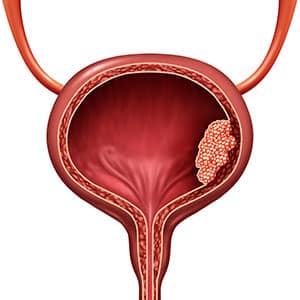Erdafitinib Granted Full Approval for Bladder Cancer
The FDA has approved the FGFR inhibitor erdafitinib for certain patients with urothelial carcinoma
The U.S. Food and Drug Administration (FDA) has approved erdafitinib (Balversa) for the treatment of adult patients with locally advanced or metastatic urothelial carcinoma that harbors certain genetic alterations in FGFR3. Patients must have experienced disease progression after one or more lines of systemic therapy and should have received prior treatment with a PD-1 or PD-L1 (PD-(L)1) inhibitor if eligible.
In 2019, erdafitinib received an accelerated approval for patients with locally advanced or metastatic urothelial carcinoma that harbors alterations in FGFR2 or FGFR3 following disease progression during or after platinum-based chemotherapy. The conversion to full approval excludes patients with tumor mutations in FGFR2 and those who are eligible for but have not received a PD-(L)1 inhibitor.

Erdafitinib is a tyrosine kinase inhibitor that blocks the activity of the FGFR family of kinases, which are commonly mutated in a variety of cancer types. FGFR mutations and gene fusions, including those involving FGFR2 or FGFR3, can promote tumor growth, survival, and metastasis.
The approval was based on results from Cohort 1 of the randomized, open-label Study BLC3001 trial, which enrolled 266 patients with FGFR3-mutated metastatic or unresectable urothelial cancer who had been previously treated with one or two systemic therapies, including a PD-(L)1 inhibitor. Patients were randomly assigned (1:1) to receive erdafitinib or chemotherapy.
Patients treated with erdafitinib had statistically significant improvements in outcomes compared with those treated with chemotherapy. Patients in the erdafitinib arm had a median overall survival of 12.1 months, a median progression-free survival of 5.6 months, and an overall response rate of 35.3%. Patients treated with chemotherapy had a median overall survival of 7.8 months, a progression-free survival of 2.7 months, and an overall response rate of 8.5%.
The recommended dose of erdafitinib is 8 mg daily, taken by mouth. If this dose is well tolerated, including no hyperphosphatemia concerns, the dose may be increased to 9 mg daily at 14 to 21 days. Treatment may continue until disease progression or unacceptable toxicity.
Urothelial carcinoma is the most common type of bladder cancer, which can affect the bladder or lower urinary tract. Approximately 30% of bladder cancers harbor alterations in FGFR genes. According to federal statistics, it was estimated that 82,290 individuals would be diagnosed with bladder cancer and 16,710 patients would die of the disease in the United States in 2023.
The FDA rendered its decision on January 19, 2024.
